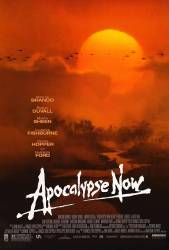
Trivia: The man shooting the movie during the attack on the beach who says "Don't look at the camera" is actually director Francis Ford Coppola. (00:25:38)
Trivia: Laurence Fishburne (who played Tyrone "Clean" Miller) lied about his age to get cast. He was 14 when production started, but told director Francis Ford Coppola that he was 17.
Trivia: Harvey Keitel was originally cast as Captain Willard. Two weeks into filming, director Francis Ford Coppola felt Keitel wasn't taking the role seriously enough, so he fired him and reshot scenes with Martin Sheen as his replacement.
Trivia: This film took so long to make critics jokingly dubbed it "Apocalypse Later", or "Apocalypse Never."
Trivia: Principal photography took 274 days. This is the same amount of time it took Peter Jackson to complete filming for all three "Lord of the Rings" films.
Trivia: Marlon Brando (Colonel Walter E. Kurtz) showed up to the set 50 pounds overweight and admitted that he had not even read the script yet. Brando demanded that he be shot only in shadow and that his scenes be almost entirely improvised. He said he did this because he didn't want to work as hard. Francis Ford Coppola has not worked with Brando (who has a notorious reputation for being a difficult actor to work with) since then.
Trivia: Robert Duvall received a Best Supporting Actor Oscar nomination for his role as Colonel "Bill" Kilgore, even though he only had 11 minutes of screen time.
Trivia: Although Marlon Brando received top billing, he doesn't appear until two and a half hours into the film and has only 15 minutes of screen time.
Trivia: Clint Eastwood was originally offered the role of Captain Willard, but he turned the film down, saying it was "too dark."
Trivia: Marlon Brando was paid $1 million in advance.
Trivia: Marlon Brando was giving director Francis Ford Coppola so much trouble towards the end of filming, that he actually left the filming of the final scene, where Sheen and Brando improvised the final moments without direction.






Chosen answer: Kurtz was protected by political connections and his military record from being relieved of command, and the Montagnard people whose village he was in were considered American allies, so they couldn't just send a force in to kill him or relieve him of command, but an individual assassin. (The US Government's "official" policy is that they do not engage in assassination, which is why "this mission does not exist, nor will it ever exist").
Captain Defenestrator